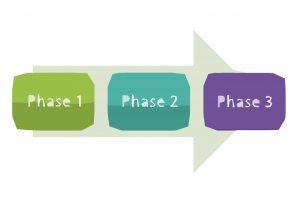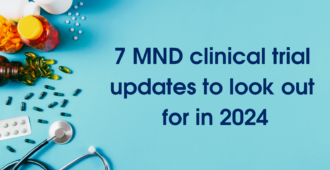Clinical trials determine if potential treatments are safe and aim to prove beyond reasonable doubt whether a drug is beneficial. They are therefore the gold standard of treatment research.
More information on the different types of clinical trial can be found on our website and in our information sheet on the topic.
This year the Symposium session on clinical trials looked at three drugs and one therapy. Dr Brian Dickie has posted a separate blog on one of these drug treatments – Edaravone.
A summary of the results from the drugs and treatments discussed is below. More information on each of them in detail is later on in this blog.
Ibudilast: This drug was safe and well tolerated in those who were not using non-invasive ventilation. However, these are results from an early stage trial so more research is needed to establish possible long-term benefit.
Methylcobalamin (Vitamin B12 injections): If this treatment is given early (within 12 months of diagnosis) then it showed an effect at increasing survival in a small sub-group of those taking part in the trial. This effect was not seen when the treatment was given further on from diagnosis.
Stem cell therapy: This small, early Phase 1/2 trial was testing the safety of bone-marrow derived stem cell injections into the spinal cord. The researchers found this treatment had no major side effects. Further studies are needed to evaluate the effectiveness and safety of this treatment over the long-term.
Full details on Ibudilast trial
A small clinical trial in the United States has looked at a potential treatment for motor neurone disease (MND) called Ibudilast.
Ibudilast is an anti-inflammatory drug that works by targeting the production of MMP-9 (Matrix metalloproteinase). We think the activity of MMP-9 is linked to MND progression, and causes parts of the motor neurones called axons to die.
The study looked at the use of Ibudilast in 60 people with MND who were not using non-invasive ventilation (NIV), and compared that to 30 using a placebo. Dr Ben Brooks (University of North Carolina, USA) presented these results at the Symposium.
Over the course of the six month study, the researchers found that Ibudilast was safe and well tolerated in people who were not on NIV and could be a feasible treatment. The treatment had no significant effect on cognitive or bulbar symptoms, though may have some benefit for respiratory weakness.
Next steps:
Ibudilast has been approved by the drug authorities in Japan, and is currently in development in the United States.
This was a very early stage clinical trial on a small group of people. Phase 1B/2A trials are primarily looking for evidence on if the treatment is safe and well tolerated in people who receive it, and not for the long-term benefits or outcomes of taking the drug. After his talk Dr Brooks commented that he would like to study the effect of Ibudilast over the long-term, to test safety and feasibility of this drug.
When asked about testing this treatment in those with more advanced MND, such as those using NIV for long periods, Dr Brooks was adamant that they too should be included in future trials for this treatment.
Further studies will be needed, involving greater numbers of people and in different countries, to prove if Ibudilast is a successful treatment for MND.
Full details on Vitamin B12 injections (Methylcobalamin)
A Japanese study group has been researching whether high-dose injections of vitamin B12 (methylcobalamin) can treat amyotrophic lateral sclerosis (ALS – one of the types of MND). More information on this drug can be found in an ALS Untangled review of the treatment.
Dr Ryuji Kaji of Tokushima University presented the results from the recent Phase 3 clinical trial of Methylcobalamin.
370 people took part in a long-term, placebo-controlled study. Twice-weekly injections of methylcobalamin (two different doses) or the placebo were given for a total of 182 weeks. In all it took seven years to complete this study, with approximately 80 people per treatment (medium dose, high dose and placebo) were included in the end data analysis.
They found that for those who were given this treatment within 12 months of being diagnosed with ALS, length of survival was increased. For those given the treatment between 12 – 36 months of onset there was no significant difference in changes to the outcome measure (ALSFRS-R scores), meaning there was less of a benefit from the highest dose of methylcobalamin, with early administration of this treatment producing the most beneficial effect.
Next steps:
The researchers will need to confirm if early administration of this treatment produces the most beneficial effect.
Alongside this, they need to work out the correct dosage of the drug to use and the best time to start giving someone this treatment (which is likely to be dependent on time since diagnosis). This may involve another Phase 3 trial, but Dr Kaji raised the issue of the practicalities of running another long term trial, and if it may be possible to give all taking part who are less than 12 months since diagnosis the drug rather than placebo treatment.
Is the treatment likely to be made available to everyone?
This study only tested methylocobalamin on Japanese people who had MND. This group of people have a different physiology (genetic makeup) to those in the United States or Europe, for example. This means that they may respond to drug treatments slightly differently than people from other countries.
Methylocobalamin injections as a treatment for MND have currently been submitted for approval in Japan.
Stem cells from bone marrow
Dr Seung H Kim, part of a research team from Hanyang University, South Korea presented on an emerging therapy for MND: stem cells.
Stem cells are the unspecialised cells in your body. These cells have the potential to become any type of cell, including motor neurones and the cells that support them.
More information about stem cells and their uses in MND research can be found on our website.
Dr Kim’s study used stem cells from the trial participant’s own bone marrow, making it less likely the participant’s immune system would reject the cells when injected into the spinal cord.
The researchers wanted to find out if injections of stem cells into the spinal cord could slow MND progression. They measured this by looking at changes in each person’s ALS Functional Rating Scale (ALSFRS-R) score, and comparing the results to people who were on a placebo injection.
They also looked at if this treatment is safe, and if any side effects develop from receiving it.
Study results
Overall, this type of stem cell treatment showed no major side effects.
People given injections of stem cells declined at a significantly lower rate than people who were in the placebo group. ALSFRS-R scores for both four and six months after receiving the first injection showed a trend towards disease stabilization.
Larger studies need to happen before we can be sure if stem cells could be a treatment for MND. We also need to track their effect on the disease over a longer period. Two large trials of stem cell therapy are currently underway in the USA and Israel – more information on these trials can be found on our website.
We have known for some time that stem cells play a part in both understanding more about the disease itself as well as potential therapies. We will be following developments in this field with interest.






Clinical trials are necessary and important step in the drug development process, and it also helps researchers solve a lot of problems. Your examples are great attempt.
It is obvious that they have done good job.
We should think all the possible options, MND is a multifactorial disease and we need to focus more than one medications. One thing is common for all chronic disease treatment need different type of medications ( poly not mono ) , I mean to control this deadly disease we need to work together. Next questions why physical contact type of sports more vulnerable to develop MND???
It seems that people have entered a new era with such research.